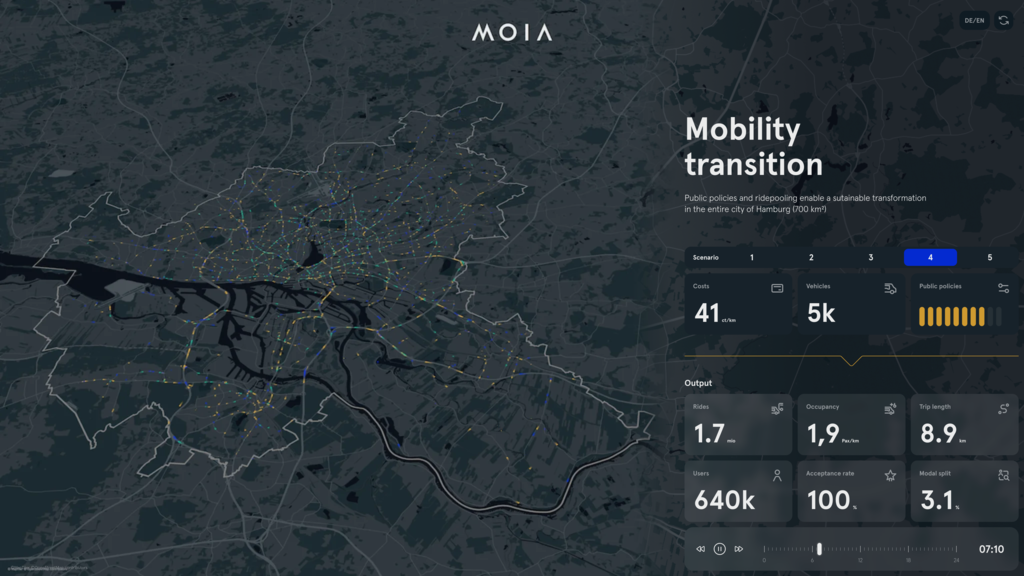New on-demand mobility services such as ridepooling or ride-hailing have various interactions with existing urban mobility landscapes. However, decision-makers often face challenges in determining whether such services are suitable under given conditions and if they can achieve desired transportation policy effects.
In collaboration with Volkswagen Group Strategy, Simunto GmbH, and nxt Engineering GmbH, MOIA has developed a cloud application named MIA (Mobility Impact Analyzer). MIA offers a unified, data-driven analysis of mobility services based on scenario-based agent-based simulations. This application provides decision-makers in cities, municipalities, transport associations, or public transport operators (PTOs) with intuitive and comprehensive analysis and visualization, supporting the decision-making process and operational planning of mobility services.
MIA combines three dimensions: ecological, economic, and social
It allows decision-makers to holistically analyze and positively transform the urban mobility system in collaboration with cities, municipalities, transport associations, or PTOs while considering all three dimensions consistently. The focus is on individuals with their diverse sociodemographic characteristics and individual mobility needs. MIA enables end-to-end digital testing of a mobility service, from analysis and conceptualization to virtual operational simulation in manual or autonomous fleets, using a representative mobility landscape of the city and its surroundings. The simulation can incorporate various parameters such as fleet size, pricing, traffic policy measures like speed limits, restricted zones, or city tolls, service areas and hours, vehicle size, and charging infrastructure.
The Technology behind MIA
MIA allows disaggregated datasets to be uploaded and processed in real-time through an API or web interface. Various chart functions provide data analysts with deep insights into statistically prepared metrics. MIA relies on easily structured, open data formats (e.g., CSV and GeoJSON) for input data, which can be produced and converted by almost all standard mobility simulations. MATSim, an open-source and method-transparent simulation software extensively utilized by MOIA and actively developed through its own engagement, is particularly suitable for detailed representation of new mobility services.
Uploaded data for one or multiple mobility scenarios can be flexibly filtered, pivoted, and viewed over time. This enables the identification of existing local weaknesses, such as in public transportation, and allows for targeted improvements through intelligent service integration.
Key findings and indicators of a mobility scenario can be supplemented with videos, images, or text contributions. This way, MIA enables the creation and visualization of customized on-demand scenarios with complexity tailored to specific target groups.
Where MIA is Already Deployed: Hamburg, Hanover, Graz, and Munich
MIA has been used to simulate not only the cities of Hamburg and Hanover, where MOIA has already established a ridepooling service but also for projects in Graz and Munich.
In the Styrian Central Region, in collaboration with Quintessenz organizational consulting and Graz University of Technology, MOIA is examining the attractiveness of ridepooling for the city of Graz and its surroundings. The project's conception involves close cooperation with local stakeholders such as the city of Graz and Holding Graz. The goal is to cover a broad spectrum of mobility needs and contribute to holistic sustainable mobility in the Styrian Central Region. Leveraging MOIA's expertise in large-scale ridepooling, this project builds upon the region's existing efforts in shared mobility.
In Munich, MOIA is working with the Technical University of Munich (TUM) and the consulting firm dmo - digital mobilities consultants - to develop a concept that promotes the expansion of shared mobility. The objective is to shift a significant portion of the trips currently made by individuals in private motor vehicles in Munich to shared mobility solutions. In collaboration with the city of Munich and relevant stakeholders such as the Munich Transportation Company (MVG) and the Munich Transport and Tariff Association (MVV), scenarios will be developed in the coming months. These scenarios will showcase what a ridepooling service in Munich could look like, possible configurations, development potentials, and the overall impact on the city's transportation system.
With MIA, we are offering an important tool to help understand todays mobility landscape and develop tailor-made on-demand mobility solutions together. The cloud application offers a way into the autonomous ridepooling future and can be used by other cities as well.
MOIA Mobility Consulting offers expertise in the field of mobility research and consulting, focusing on data-based analyses and simulations of ridepooling operating concepts. Get in touch with our experts.

